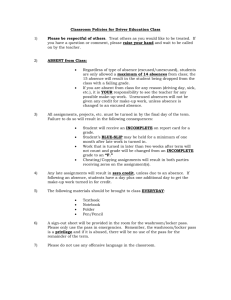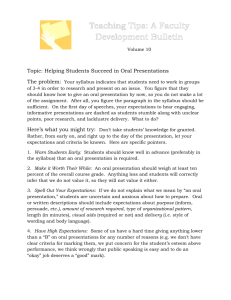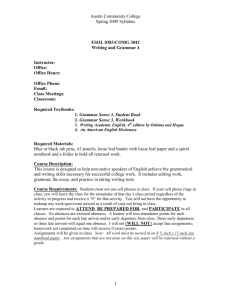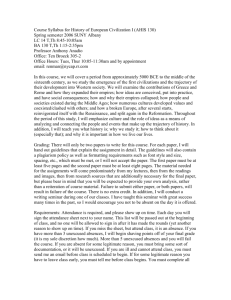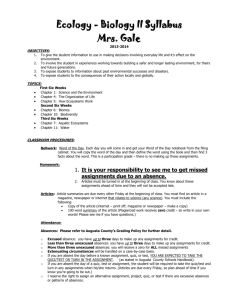Management of International Business (MGT 310 Syllabus)
advertisement
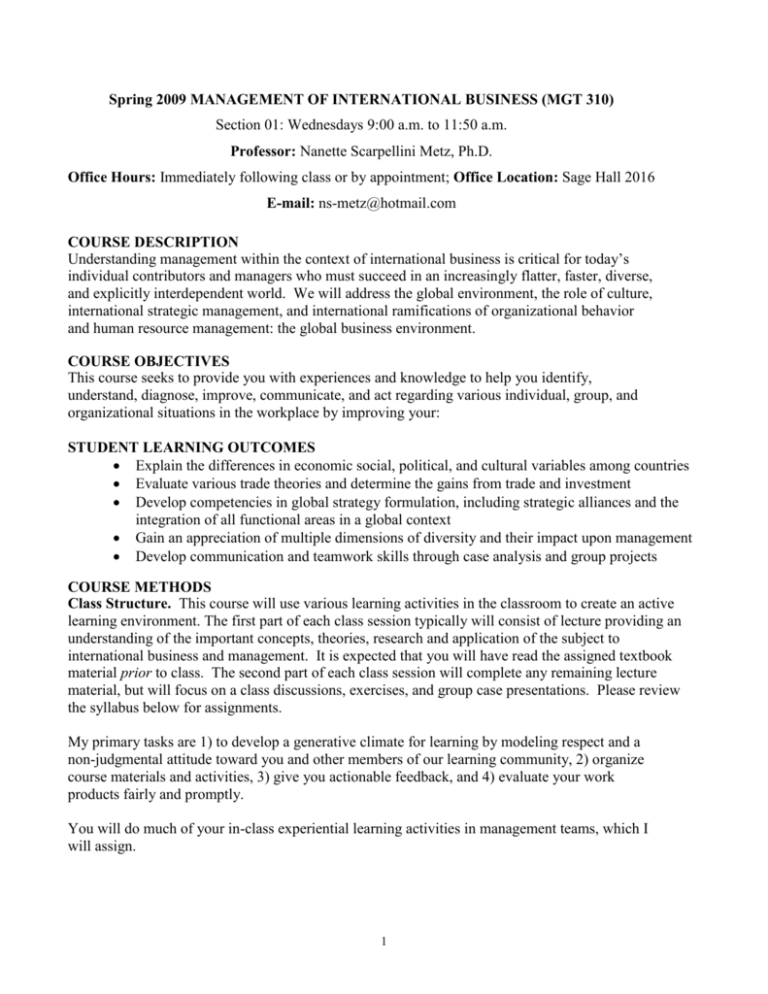
Spring 2009 MANAGEMENT OF INTERNATIONAL BUSINESS (MGT 310) Section 01: Wednesdays 9:00 a.m. to 11:50 a.m. Professor: Nanette Scarpellini Metz, Ph.D. Office Hours: Immediately following class or by appointment; Office Location: Sage Hall 2016 E-mail: ns-metz@hotmail.com COURSE DESCRIPTION Understanding management within the context of international business is critical for today’s individual contributors and managers who must succeed in an increasingly flatter, faster, diverse, and explicitly interdependent world. We will address the global environment, the role of culture, international strategic management, and international ramifications of organizational behavior and human resource management: the global business environment. COURSE OBJECTIVES This course seeks to provide you with experiences and knowledge to help you identify, understand, diagnose, improve, communicate, and act regarding various individual, group, and organizational situations in the workplace by improving your: STUDENT LEARNING OUTCOMES Explain the differences in economic social, political, and cultural variables among countries Evaluate various trade theories and determine the gains from trade and investment Develop competencies in global strategy formulation, including strategic alliances and the integration of all functional areas in a global context Gain an appreciation of multiple dimensions of diversity and their impact upon management Develop communication and teamwork skills through case analysis and group projects COURSE METHODS Class Structure. This course will use various learning activities in the classroom to create an active learning environment. The first part of each class session typically will consist of lecture providing an understanding of the important concepts, theories, research and application of the subject to international business and management. It is expected that you will have read the assigned textbook material prior to class. The second part of each class session will complete any remaining lecture material, but will focus on a class discussions, exercises, and group case presentations. Please review the syllabus below for assignments. My primary tasks are 1) to develop a generative climate for learning by modeling respect and a non-judgmental attitude toward you and other members of our learning community, 2) organize course materials and activities, 3) give you actionable feedback, and 4) evaluate your work products fairly and promptly. You will do much of your in-class experiential learning activities in management teams, which I will assign. 1 COURSE MATERIALS Daniels, Radebaugh & Sullivan: International Business Environments and Operations, 12th Edition. ISBN: 978-0-13-602965-6; Prentice Hall. Selected articles and handouts that will be distributed in class, posted for you on Blackboard, or e-mailed to you. ASSIGNMENTS You are expected to complete readings and activities for each session, which will inform your class experience and increase the conceptual strength of your work. Lack of preparation will impact the quality of your participation and your performance on quizzes, papers, and presentations. Quizzes: 4 quizzes on the text material worth 40% of total grade. Research Team Project—Paper and Presentation: Students will be organized into 5 research teams at the beginning of the semester. Each team is a group of entrepreneurs with a brilliant idea to expand their business internationally. The board of directors has asked each team to investigate the opportunities in one foreign country. The team will prepare a written report that evaluates the opportunities and risks associated with a decision to undertake Foreign Direct Investment in a country of their choice. Guidelines and specifics on the content of this report will be provided in class. The paper is due on May 6th. You will be graded on the quality of the research paper and your individual contribution as evaluated by your teammates. This paper contributes 20% toward your final grade. Your team will present to the class your analysis, findings, and recommendations of your research paper using presentation software such as PowerPoint. All team members must present. The presentation contributes 5% toward your final grade. Student complete of presentation rubrics accounts for 5% of your final grade. Team Chapter and Case Presentation: Each team will provide an integration of a specific chapter case study as indicated in the syllabus and the relevant material from the chapter. This means explaining all terms, concepts or other relevant material from the chapter as it applies to the specific case study. This integration should also address the case questions to show an overall understanding of the issues applicable to the case. The case questions will help add structure to the presentation. Class handouts (1 to 2 pages) are required. The handouts should highlight the key points, but should not be a mere copy of the presentation. All the other students will evaluate the team’s presentation using an assessment rubric. This project accounts for 10% of your final grade. Team Guest Speaker Preparation: Throughout the course of the semester, five guest speakers will address the class. For each speaker, one of the teams will review the speaker’s background and/or company and prepare questions for the speaker to address during the question and answer period. Student from other groups are also welcome to ask questions. This preparation accounts for 5% of your final grade. International Current Event Presentation: An oral presentation to be given by each student. Professor will select the date. Student selects the current event and brings relevant articles or 2 other materials to explain issue to class. Be sure to discuss the key elements of who, what, when, where, why and how. Explain how it is relevant to the class. The presentation contributes 5% toward your final grade. WRITTEN ASSIGNMENT STANDARDS Typed on white paper using black ink Single-sided Double-spaced (unless specifically told otherwise) 12-point font Times New Roman or Arial 1” margins all four sides Page numbers at the bottom center of each page Headings to delineate topic changes or sections Stapled hard copy (Unless I have approved electronic submission) At or under the page maximum On time (late assignments are not accepted. The exceptions are pre-arranged excused absences or documented medical/family emergency). PERFORMANCE EVALUATION Your participation in our learning community assignments, discussions, and activities is critical to your learning and that of your classmates. Therefore, barring extenuating circumstances (e.g., floods, fires, acute medical emergencies, death or grave illness of close family members, etc.) attendance is mandatory**. Missing more than 2 classes without an approved excuse, chronic tardiness, or frequent disengagement (e.g., talking, sleeping, chatting, etc.) in class will negatively impact your grade. Though important, work and work-related absences are not excused absences. Similarly, non-emergency doctor’s appointments are not excused. Required and non-reschedulable CSUCI-related activities are excused. ABSENCE POLICY 1-2 sessions unexcused absences: 3 sessions unexcused absences: 4 sessions unexcused absences: 5+ sessions unexcused absences: no penalty (Personal Time) 1 grade penalty from course grade 2 grade penalty from course grade 3 grade penalty from course grade **If you are an athlete or if you have a documented disability, notify me during the first week of class. Notification means showing me official documentation, discussing specific challenges and constraints we need to manage, and mutually agreeing upon ways to ensure your success. Athletes, please give me one list of the dates you will miss so that we can plan accordingly. ACADEMIC INTEGRITY Breaches of academic integrity are unacceptable. Please refer to the University’s statement on Academic Integrity at the following link: http://www.csuci.edu/academics/catalog/20062007/12_policiesandregulations/50_academicdishonesty.htm Unless specified otherwise, assume that all assignments are to represent your individual (or your team’s as appropriate) intellectual contributions. While you are free to discuss assignments with 3 each other, all experiences analyzed and conceptual explanations provided must be unequivocally yours. Similarly, cite authors in your papers and presentations (use American Psychological Association style). For example, it is not ethical to write about the “Hierarchy of Needs” without citing Maslow (even though “everyone knows” it’s his work). If I discover that you have cheated on any assignment, your grade on the assignment will be “F.” Additionally, you will be reported to the appropriate University Committee. STATEMENT ON DISRUPTIVE BEHAVIOR We will be respectful and act in a civil manner in this class. Any acts of disruption that go beyond the normal rights of students (and instructors) to question and discuss the educational process relative to subject content will not be tolerated. WEIGHTING OF ASSIGNMENTS Individual or Team Grade Graded Activity Individual Class Participation & Attendance (per person) International Current Event Presentation-oral presentation (Professor picks the date; student picks current event) Individual Individual 4 Quizzes % of Grade 10 5 40 Individual Total 55% Team Team Speaker Preparation (1 per team) 5 Chapter Summary and In depth Case Reports (1 per team) Research Team Paper (1 per team) Paper and Feedback Team Team Team 10 25 Research Team Presentation 5 Team Total 45% Grand Total 100% GRADING With the exception of quizzes, I grade in “Letters” not “Numbers.” Below is the key that I use to enter your grades into a Spreadsheet or Blackboard for calculation purposes. After entering and weighting your grades, I round them to the appropriate integer. That integer, barring extenuating circumstances, corresponds to a grade category below…period. If your letter grade is: F D GPA 0 1 D+ 1.25 C- C C+ B- B B+ A- A 1.75 2 2.25 2.5 3 3.25 3.5 3.75 4 A+ 4 Management of International Business (MGT 310 Syllabus) Class Meetings 1/21 1/28 Chapter/Topic Introductions, Syllabus, Chapter 1: Globalization & International Business; Presentation Tips, Executive Summary Tips Form Research Teams Chapter 12: Country Evaluation & Selection 2/4 Chapter 2: The Cultural Environment Facing Business 2/11 Chapter 3: The Political & Legal Environments Facing Business Chapter 4: The Economic Environments Facing Businesses; Chapter 5: Globalization and Society Chapter 6: International Trade and FactorMobility Theory Chapter 7: Governmental Influence on Trade; Chapter 8: Cross-National Cooperation and Agreements Chapter 9: Global Foreign-Exchange Markets; Chapter 10: The Determination of Exchange Rates Chapter 11: The Strategy of International Business 2/18 2/25 3/4 3/11 3/18 3/25 4/1 4/8 4/15 4/22 Chapter 13:Export & Import Strategies Chapter 14: Direct Investment and Collaborative Strategies; Chapter 15: The Organization of International Business Chapter 16: Marketing Globally; Chapter 17: Global Manufacturing and Supply Chain Management Chapter 18: International Accounting Issues 4/29 Chapter 19: The Multinational Finance Function Chapter 20: Human Resource Management 5/6 Research Team Presentations 5/13 Research Team Presentations + Course Wrapup Enjoy the summer! 5 Due TODAY (addition to reading the Chapter) Research Team Formation Research project overview. Quiz #1; Research Team meeting with professor. Final industry and host country determination is due. Group 1: Chapter 5 Summary and In Depth Case Presentation Quiz #2; Group 5: Outside Speaker Preparation Group 2: Chapter 8 Summary and In Depth Case Presentation Group 3: Chapter 10 Summary and In Depth Case Presentation Research status reports and project completion plans are due. Group 4: Outside Speaker Preparation Quiz #3 Group 4: Chapter 15 Summary and In Depth Case Presentation Group 5: Chapter 17 Summary and In Depth Case Presentation Group 3: Outside Speaker Preparation Group 2: Outside Speaker Preparation Quiz #4; Group 1: Outside Speaker Preparation Turn in Team Paper and Peer Evaluations Research Team presentations Peer Evaluations Research Team presentations


